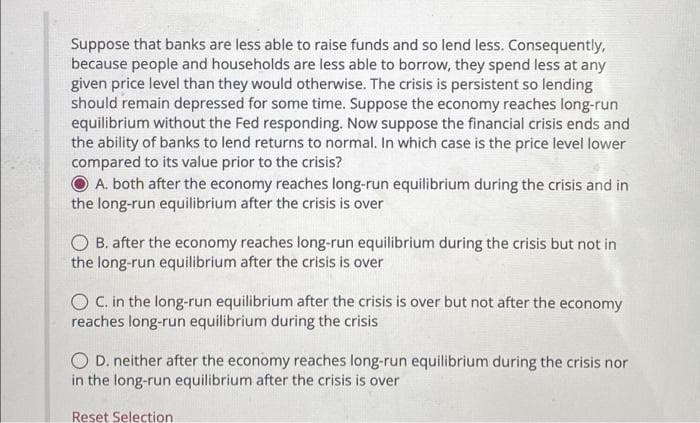Suppose that banks are less able to raise funds and so lend less. Consequently, because people and households are less able to borrow, they spend less at any given price level than they would otherwise. The crisis is persistent so lending should remain depressed for some time. Suppose the economy reaches long-run equilibrium without the Fed responding. Now suppose the financial crisis ends and the ability of banks to lend returns to normal. In which case is the price level lower compared to its value prior to the crisis? A. both after the economy reaches long-run equilibrium during the crisis and in the long-run equilibrium after the crisis is over B. after the economy reaches long-run equilibrium during the crisis but not in the long-run equilibrium after the crisis is over
Suppose that banks are less able to raise funds and so lend less. Consequently, because people and households are less able to borrow, they spend less at any given price level than they would otherwise. The crisis is persistent so lending should remain depressed for some time. Suppose the economy reaches long-run equilibrium without the Fed responding. Now suppose the financial crisis ends and the ability of banks to lend returns to normal. In which case is the price level lower compared to its value prior to the crisis? A. both after the economy reaches long-run equilibrium during the crisis and in the long-run equilibrium after the crisis is over B. after the economy reaches long-run equilibrium during the crisis but not in the long-run equilibrium after the crisis is over
Brief Principles of Macroeconomics (MindTap Course List)
8th Edition
ISBN:9781337091985
Author:N. Gregory Mankiw
Publisher:N. Gregory Mankiw
Chapter16: The Influence Of Monetary And Fiscal Policy On Aggregate Demand
Section: Chapter Questions
Problem 8PA
Related questions
Question
9.

Transcribed Image Text:Suppose that banks are less able to raise funds and so lend less. Consequently,
because people and households are less able to borrow, they spend less at any
given price level than they would otherwise. The crisis is persistent so lending
should remain depressed for some time. Suppose the economy reaches long-run
equilibrium without the Fed responding. Now suppose the financial crisis ends and
the ability of banks to lend returns to normal. In which case is the price level lower
compared to its value prior to the crisis?
A. both after the economy reaches long-run equilibrium during the crisis and in
the long-run equilibrium after the crisis is over
O B. after the economy reaches long-run equilibrium during the crisis but not in
the long-run equilibrium after the crisis is over
O C. in the long-run equilibrium after the crisis is over but not after the economy
reaches long-run equilibrium during the crisis
O D. neither after the economy reaches long-run equilibrium during the crisis nor
in the long-run equilibrium after the crisis is over
Reset Selection
Expert Solution
This question has been solved!
Explore an expertly crafted, step-by-step solution for a thorough understanding of key concepts.
This is a popular solution!
Trending now
This is a popular solution!
Step by step
Solved in 2 steps

Knowledge Booster
Learn more about
Need a deep-dive on the concept behind this application? Look no further. Learn more about this topic, economics and related others by exploring similar questions and additional content below.Recommended textbooks for you

Brief Principles of Macroeconomics (MindTap Cours…
Economics
ISBN:
9781337091985
Author:
N. Gregory Mankiw
Publisher:
Cengage Learning

Essentials of Economics (MindTap Course List)
Economics
ISBN:
9781337091992
Author:
N. Gregory Mankiw
Publisher:
Cengage Learning

Exploring Economics
Economics
ISBN:
9781544336329
Author:
Robert L. Sexton
Publisher:
SAGE Publications, Inc

Brief Principles of Macroeconomics (MindTap Cours…
Economics
ISBN:
9781337091985
Author:
N. Gregory Mankiw
Publisher:
Cengage Learning

Essentials of Economics (MindTap Course List)
Economics
ISBN:
9781337091992
Author:
N. Gregory Mankiw
Publisher:
Cengage Learning

Exploring Economics
Economics
ISBN:
9781544336329
Author:
Robert L. Sexton
Publisher:
SAGE Publications, Inc

Principles of Economics (MindTap Course List)
Economics
ISBN:
9781305585126
Author:
N. Gregory Mankiw
Publisher:
Cengage Learning

Principles of Macroeconomics (MindTap Course List)
Economics
ISBN:
9781305971509
Author:
N. Gregory Mankiw
Publisher:
Cengage Learning

Principles of Economics, 7th Edition (MindTap Cou…
Economics
ISBN:
9781285165875
Author:
N. Gregory Mankiw
Publisher:
Cengage Learning